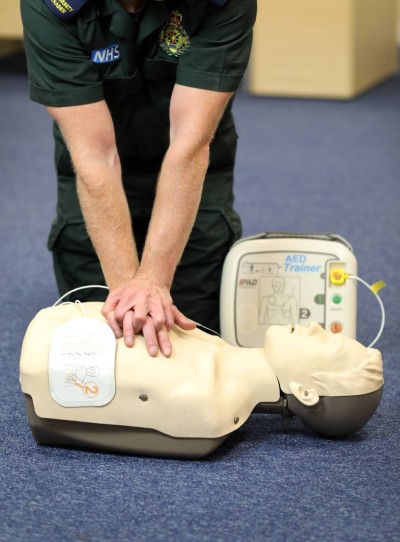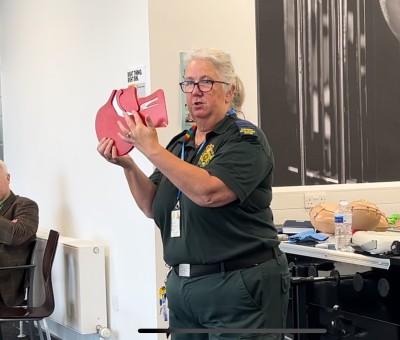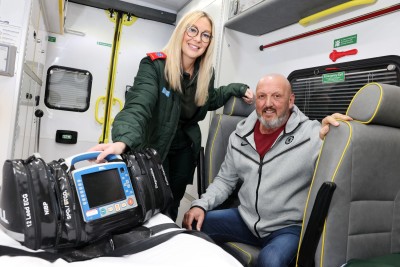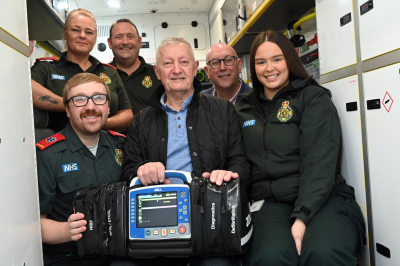North East Ambulance Service (NEAS) is supporting Restart a Heart Day 2025, an 
Restart a Heart Day takes place every year on 16 October and aims to increase public awareness of early intervention for cardiac arrests as well as increase the number of people trained in lifesaving CPR.
In the last year, NEAS community resuscitation officers have trained 3,844 staff, college and school students, businesses and community groups across the North East.
This year, community resuscitation officers from the North East Ambulance Service’s training department are visiting the following schools and colleges to help teach the next generation lifesaving skills:
- Stockton Riverside College
- Darlington College
- Bede Sixth Form College
- Redcar & Cleveland College
Cardiac arrest can strike anybody at any time in any place, and every minute without CPR and defibrillation reduces the chance of survival by 10%. On average, NEAS health advisors support over 1,800 callers to give CPR over the phone each year.
Millions of people in the UK won’t have had the opportunity to learn this key lifesaving skill – putting lives at risk. In 2024, NEAS attended 5,733 out-of-hospital cardiac arrest calls with over half (50.2%) being witnessed by a bystander.
Restart a Heart Day is more than just teaching CPR skills – attendees are trained on how to put an automated external defibrillator (AED). During all out-of-hospital cardiac arrests last year (2024), an AED was used in 9.4% of the cases.
An AED is usually located in buildings that are permanently open, such as hotels, or in special cabinets on the outside of buildings. The defibrillator gives a jolt of energy to the heart, which can help restore the heart’s rhythm and get it beating normally again.
Alex Mason, community development officer at the Trust, said:
“For an ambulance crew attending a cardiac arrest, knowing there’s someone there who can support the patient while the crew are travelling is a great reassurance. It’s heartening for them to know the community are doing their bit in the chain of survival.
“If you start CPR within two minutes, use a defibrillator within four minutes, and a paramedic arrives within eight minutes, patients will have a 40% chance of survival.”
Since the start of the year, NEAS have reunited three cardiac arrest survivors with the crew that saved them, you can find out more about their story below:
Sixty-year-old Graham, from Houghton Le Spring, was feeling a bit under the weather with breathlessness, a pain down his left arm, and a heavy feeling in his legs when his partner Marie became concerned.
An emergency ambulance crew from North East Ambulance Service was dispatched to the incident, with newly qualified paramedic Hayley Francis and her crew mate on board.
Just as the crew arrived, father of two, Graham, deteriorated and he went into cardiac arrest.
Hayley began CPR (cardiopulmonary resuscitation) whilst her crew mate applied the defibrillator. Once the pads were applied, Hayley continued the chest compressions until Graham’s heartbeat was in a shockable rhythm.
One shock was delivered to Graham which thankfully brought him around.
To find out more about Graham's story, visit: https://www.neas.nhs.uk/news-and-events/latest-news/survivor-cardiac-arrest-thanks-crew-who-saved-his-life

Seventy-three-year-old George Newman, from Sunderland, began to feel ill with chest and arm pains on Saturday 2 November, after enjoying an evening firework display with his family.
His wife, Brenda, became concerned and called 999 to get support from North East Ambulance Service (NEAS).
On one of her first ever dispatch shifts for the service, twenty-three-year-old ambulance dispatcher at NEAS, Ellen Renwick, was responsible for sending an ambulance crew to George's home.
On arrival of the ambulance, George deteriorated and went into cardiac arrest.
On arrival, paramedic Stuart Tait and his crew mate Ian Cawood, began chest compressions and applied the defibrillator. Once his heartbeat was in a shockable rhythm, they administered five shocks.
George regained consciousness, and survived, thanks to the efforts of his family, the call handling team, and ambulance crew.
You can find out more about George's story here: https://www.neas.nhs.uk/news-and-events/latest-news/cardiac-arrest-survival-north-east-resuscitation-recovery

On 11 January 2025, Philip Wright, 71, had just attended a Sunderland vs Stoke City match with his friend when he went into cardiac arrest at ‘The 3 Stories Bar’ later that day in Sunderland.
Tuesday 25 March 2025 marks the first time Philip has been able to meet and thank the crews and police officer who saved his life.
Philip said: "I don't remember anything from my cardiac arrest, only that I know I was with my friend when it happened. I hadn't even experienced any symptoms beforehand, so it really came as a shock to those around me."
You can find out more about Philip’s story here: https://www.neas.nhs.uk/news-and-events/latest-news/sunderland-football-fan-who-scored-second-chance-life-reunites-ambulance-service-team-following-cardiac-arrest


